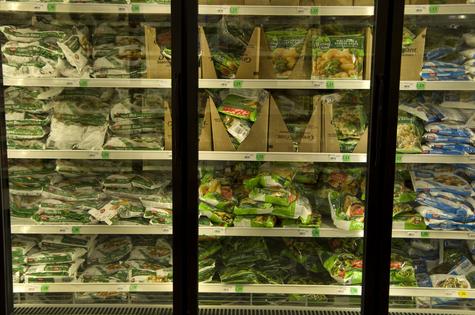Environmental Nutrition: Don’t bypass the frozen foods
Nearly every health expert will be quick to tell you that it’s a good idea to load up your shopping cart with more vegetables and fruits. Their unique nutritional stew of fiber, antioxidants, vitamins, and minerals is key to lasting health. But sometimes fresh options in the produce aisle don’t look so fresh and are expensive, especially when out of season locally. That’s when it’s time to spin your wheels towards the frozen food department for the unsung subzero heroes of the supermarket. Certainly, fruits and veggies don’t always have to be fresh to be best.
There’s a common misconception that frozen fruits and veggies are not as healthy as their fresh counterparts, but New York City dietitian Deborah Malkoff-Cohen says this is not necessarily true. “Fruits and vegetables are picked when they are at their peak ripeness and flash-frozen to retain all of their nutrients, antioxidants, and flavor.”
And this occurs shortly after harvesting so think of the process as Mother Nature’s pause button. (Many vegetables undergo blanching in hot water for a short time before freezing to inactivate enzymes that degrade color, smell, flavor, and nutritional value.) For some items like green peas and peaches, frozen retains a much more appetizing vibrant color than canned.
Contrast this with fresh out-of-season produce fated for long-haul shipping which are generally picked before ripe and, in turn, fall short of their full nutritive and flavor potential; plus, long-haul transport from farm to fork and lengthy storage times can further degrade nutrition and taste. “Produce sold fresh that is grown far away can be ripened with ethylene gas to reach peak ripeness once they get to their destination,” notes Malkoff-Cohen.
To this point, an analysis of frozen and fresh-stored fruits and vegetables published in the Journal of Food Composition and Analysis found that in many cases, items like broccoli, green beans, corn, and blueberries retained higher levels of vitamin C, beta-carotene, and folate when in frozen form compared to fresh as these nutrients are diminished during days of refrigerator storage. Cup for cup, Malkoff-Cohen calls out frozen spinach for having notably higher amounts of fiber, iron, folate, and calcium than its fresh counterpart.
Overall, a study in the journal Nutrients shows that people who sneak more frozen fruits and vegetables into their diets take in higher amounts of must-have nutrients like fiber, calcium, and potassium. Still, Malkoff-Cohen recommends opting for fresh produce when they are in season especially if they are locally grown or from a nearby farm stand. “For some dishes like stir-fries and salads sometimes you just want the crunchy texture of fresh.”
Busy schedules can make it a challenge to prep and cook fresh produce all of the time. Malkoff-Cohen explains that buying frozen which are often already chopped, pitted or peeled for you can make healthy eating more convenient. Simply toss a few cups of frozen broccoli florets into a soup, stir some pitted deep freeze cherries into a pot of simmering oatmeal, toss thawed corn kernels in a bean salad, and whip up a smoothie with cubed frozen mango.
With a quick heat in the microwave, pre-chopped frozen vegetable mixes can be your answer to an ultra-quick side-dish. “The variety of fruits and vegetables you eat can increase tremendously when you add in frozen types,” says Malkoff-Cohen. And that is a pathway to eating a more nutritionally diverse diet.
But preparation matters when it comes to the nutrition on your plate. When you grab that bag of frozen cauliflower and start preparing dinner, boiling runs the risk of leeching out water-soluble nutrients like vitamin C and folate. Malkoff-Cohen suggests steaming, microwaving, roasting, and stir-frying as less destructive cooking methods.
If you’re looking to cut back on food waste and its added cost to you and the environment, you don’t have to worry about eating your frozen raspberries before white fuzz takes over. Space permitting, you can buy a lot more frozen veggies and fruits well in advance and use them as desired in the weeks to come. In contrast, the clock is ticking as soon as you bring fresh spinach and strawberries home before they spoil.
...continued







